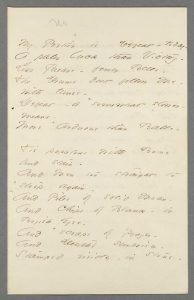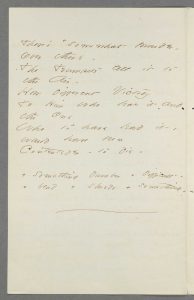My Portion is Defeat – today –
A paler luck than Victory –
Less Paeans – fewer Bells –
The Drums dont follow Me –
with tunes –
Defeat – a +somewhat slower –
means –
More +Arduous than Balls –
Tis populous with Bone
and stain –
And Men too straight to
+ stoop again –
And Piles of solid Moan –
And Chips of Blank – in
Boyish Eyes –
And + scraps of Prayer –
And Death’s surprise,
Stamped visible – in stone –
There’s +somewhat prouder,
Over there –
The Trumpets tell it to
the Air –
How different Victory
To Him who has it – and
the One
Who to have had it,
would have been
Contenteder – to die –
+something dumber + difficult –
+bend +shreds + something
Link to EDA manuscript. Originally in Poems: Packet IX, Fascicle 33, dated ca. 1862. First published in Saturday Review of Literature, 5 (9 March 1929), 751, and Further Poems (1929), 126, with the alternatives adopted and the text in twenty-two lines without stanza division. Courtesy of the Houghton Library, Harvard University, Cambridge, Mass.
This is another poem that could be read as spoken in a soldier’s voice, but this time, a soldier who has been defeated, and is looking “Over there” at the victorious troops. It is somewhat unusual for being written in stanzas of six lines of 886886 rhyming aabaab. The voice has the musing detachment of someone who is in shock, what we would today call post-traumatic shock. For this speaker, “Defeat” feels like a more “Arduous,” and if we consider Dickinson’s variant, “dumber” means of stopping action “than Balls,” because it is psychological rather than purely physical. It literally strikes one dumb.
In the arresting second stanza, the speaker describes a post-battle scene that is chaotic, fragmented, and rhetorically metonymic, in which nothing is whole or natural, and everything evinces the frozen or sculptural character Dickinson associated with death. It is a place populated by “Bone and stain” and “Piles of solid Moan,” an unforgettable image. “Boyish Eyes” contain “Chips of Blank” and “scraps of Prayer,” and the suddenness of death makes the faces of the fallen appear as if “in stone.”
For Cristanne Miller, the poem “questions conventional rhetoric of victory through a striking portrait of suffering on a battlefield.” Shira Wolosky argues that here, as in other poems about the war, Dickinson
scrupulously refrained from taking sides. She sympathized with the defeated without partisanship. She could not celebrate victory, regardless of the victors. … Instead, she is left with the problem of inexplicable suffering and with questions concerning the justice of God itself.
Sources
- Miller, Cristanne. Reading in Time: Emily Dickinson in the Nineteenth Century. Amherst: University of Massachusetts Press, 2012, 154.
- Wolosky, Shira. “Dickinson’s War Poetry: The Problem of Theodicy.” Massachusetts Review 25,1 (Spring 1984): 22-41, 35.



